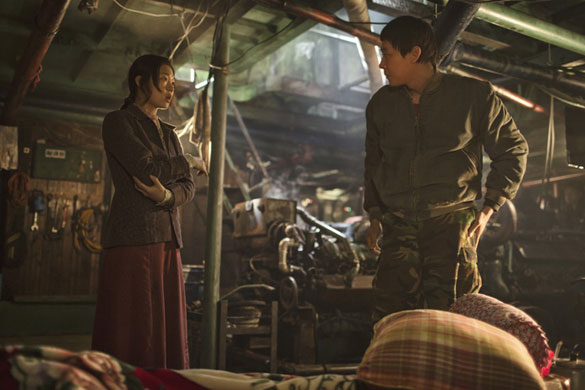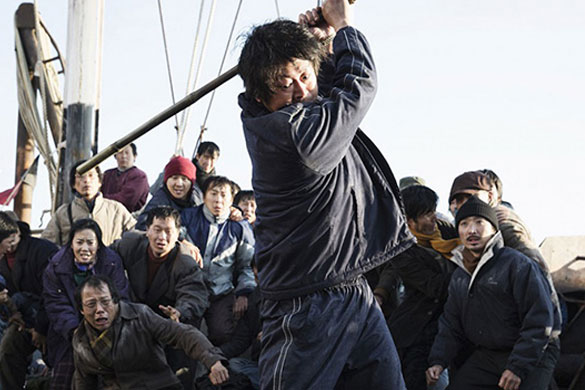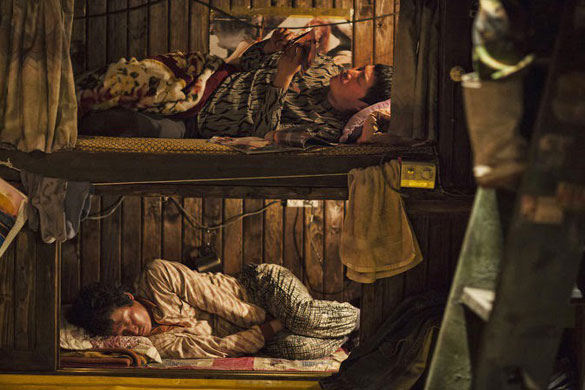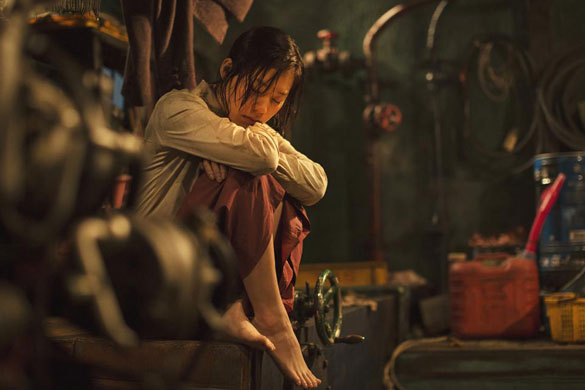"What we did today, we can't just keep it in our heads forever..."
Synopsis:
Cheol-joo (Kim Yoon-seok) is the captain of a small and fairly dilapidated fishing vessel working out of the small Korean port of Yeosu in the late 1990s. With the IMF Crisis in full swing, increasingly small or indeed non-existent catches leave him facing constant financial problems that threaten to destroy his livelihood entirely; finding himself having to borrow money just to feed his crew even before he considers how on earth he'll find the means to fix his boat’s growing number of mechanical faults.
Already at the end of his tether, company bosses threatening to retire his boat once and for all finally push Cheol-joo over the edge and in utter desperation he reluctantly agrees to a somewhat dubious associate’s proposition to use his boat to help smuggle a group of Joseon-joks (Chinese citizens of Korean descent) from China to Korea.
However, though Cheol-joo is aware of the dangers of being caught in the act of human smuggling, he has no idea of how life-threatening his decision will ultimately be...
Review:
Sea Fog's early scenes show the struggles, difficulties and indeed dangers of the day-to-day lives of Cheol-joo and his crew as fisherman at sea (one character, for example, almost gets his leg crushed in a winch after being caught up in a fishing net being reeled in, leading to more mechanical damage in the saving of his life). Subsequently, viewers are given an, albeit brief, insight into the private home lives of Cheol-joo and Dong-sik (Park Yoo-chun) – the youngest member of the crew – and the fact that only these two characters’ home lives are shown in any respect positively screams that they will ultimately play a far larger role in proceedings than the vast majority of the other crew members. However, that does mean that certain of the other supporting players are virtually as much caricatures as they are characters, per se- the character of Chan-wook (Lee Hee-jun), for example, is little more than a sex-obsessed oaf who spends most of his time whining that everyone has had sex with female illegal immigrant Hong-mae (Han Ye-ri) except for him; a statement that isn't even true–but while they are not given as much character depth as they perhaps could have been, that really is a minor niggle as far as I'm concerned – ultimately not detracting from what is overall a gripping and important story (more on that later), and with so many characters overall present it is ultimately right that the main focus should be on the 'big hitters', if you will, vital to the film's conclusion; those of Cheol-joo, Dong-sik and indeed Hong-mae.
And speaking of Hong-mae:
We are introduced to this seemingly fragile young woman in a nail-biting, edge of your seat scene in which the illegal immigrants try to move in the black of night from the freighter bringing them from China to Cheol-joo’s vessel; virtually having to launch themselves from one boat to the other with only the murky depths of the sea beneath. Hong-mae fails in her attempt, plunging into the ocean and instantly sinking, and it's only Dong-sik’s quick thinking in diving in after her that saves her from a watery grave. From that very moment, Dong-sik’s feelings for Hong-mae are set and his need to protect her in the wake of an absolute tragedy taking place and all Hell subsequently breaking loose is guaranteed; one of the film's strongest sub-plots that ultimately becomes a major and pivotal narrative thread.
 |
Sea Fog is based on a real life tragedy that befell a group of Chinese-Korean immigrants attempting to illegally reach Korea by boat in 2001. However, while their shocking and poignant story is where Sea Fog really takes off, it's the underlying commentary on the human condition that is the film's ultimate raison d'être. The fact that Sea Fog’s screenplay was co-written by Bong Joon-ho (along with director Shim Sung-bo) means it will likely come as no surprise that this commentary isn't wholly positive. Bong is known for having strong, often cutting opinions on humanity in general and Korean society specifically, and those feelings frankly scream out of Sea Fog from start to finish:
Cheol-joo, especially, is shown from the very outset to be utterly self-serving, caring only about his boat and the livelihood it facilitates – even in the early stages of the film this theme is apparent with Cheol-joo being so preoccupied with problems relating to his boat that he almost ignores the fact that he returns home to find his wife having sex with another man – and indeed his self-obsessed, self-preserving nature and focus lead directly to his sometimes questionable, often shocking actions in relation to the illegal immigrants both before and after the aforementioned tragedy. However, it could also be said that young Dong-sik’s outwardly altruistic focus on protecting Hong-mae at all cost, too, stems from his (again self-serving) need to try to ensure that what he cares about for himself specifically comes to fruition; that is having Hong-mae in the long-term.
Even Hong-mae’s actions (in spite of her being by far the most innocent of all the characters) are, in the film's penultimate scene, shown to have been driven by her all-consuming desire to get what she wants for herself; that is, the freedom that South Korea would bring her and indeed the freedom to make her life what she wants it to be, regardless of anyone else’s needs or desires.
In fact, there is only one character in the whole of Sea Fog who truly wants to do the ‘right thing' in the wake of the tragedy without any thought for themselves but, at the hands of the aforementioned self-serving, that altruism simply guarantees a personal outcome far more than bleak. Say what you like about the darkness of the themes presented, but humanity is as humanity does and the realism they bring to proceedings ensures Sea Fog is as thought provoking as it is shockingly and poignantly gripping.
 |
As a final note on the themes present: A number of Korean films of late (Yellow Sea and the like) have focused on Joseon-joks and the misguided belief of many in South Korea that they are somehow, somewhat second class citizens. While Sea Fog’s depiction of the continuing uneasy relationship between Chinese-Koreans and native Koreans is brief, it does nonetheless point directly at the issue and indeed speaks of the contrasting but equally bigoted perceptions of Joseon-joks to South Koreans, in contrast.
The death toll in Sea Fog would frankly put virtually any revenge or serial killer K-film to shame; the sheer darkness of proceedings greatly strengthened by both cinematography and production design. Repeated close-up camera framing – almost to the point of intrusion – combined with deliberately cramped settings and an increasing sea fog enveloping and obliterating views outside the immediacy of the boat itself add a palpable claustrophobic element giving the feeling that there is ultimately nowhere for these morally questionable characters to hide their secrets and agendas, regardless of how hard and desperately they try.
A play of the same name telling the story of the immigrants preceded Sea Fog as a film and with the scene settings largely centred around the boat itself as well as the aforementioned fog et al makes it easy to see how this tale was so well suited to a theatre production, but to my mind the wholly invasive nature of Sea Fog’s visuals makes the delivery of the narrative far more effective than any play on a somewhat distant stage could achieve.
With such a story of poignant tragedy succeeded by harrowing travesty, it would have been all too easy for Sea Fog to step into the realms of melodrama on numerous occasions – as is almost par for the course in Korean cinema – but director Shim Sung-bo wisely avoids such histrionics entirely allowing Sea Fog to be and indeed remain as wholly dark and brooding as it truly should be.
Summary:
Based on a real life shocking tragedy, Sea Fog is a truly dark tale both gripping and shocking, and having been co-written by Bong Joon-ho frankly guaranteed the narrative would also be thematically rich with social commentary and indeed critique.
You can also read the Hangul Celluloid 2012 individual interview with actor Kim Yoon-seok at:
http://www.hangulcelluloid.com/kimyoonsukinterview.html
UK Blu-ray release:
88 Films (@88_Films) will release SEA FOG (해무 / 2014) on Blu-ray in the UK on 26 March, 2018.
The official press release is as follows:
"SEA FOG is one of the Korean wave's most potent stories and a visually arresting action-packed effort. Telling of an illegal immigrant operation in South Korea, focused on bringing 30 mainland Chinese star-watchers to the hustle and bustle of Busan and Seoul, which ends in terrifying tragedy, SEA FOG is a tense thriller and a blistering viewing experience. Produced by the legendary Bong Joon-ho (THE HOST) and with a cast that includes the great Kim Yoon-seok (THE CHASER) and K-pop icon Park Yoo-chun (formerly of TVXQ), SEA FOG is an adventure on the high sea that ranks as one of East Asian cinema's most masterful recent achievements!"
SPECIAL EDITION CONTENTS
All About Bong: Interview with Jean Noh, Deputy East Asia Editor for Screen International
Visual Effect Reel
TECHNICAL SPECS
Region Code: B
Picture Format: HD 1080p 2.35:1
Audio Format: 5.1 Surround Sound
Language: Korean with English Subtitles
Certification: TBC
Running Time: 111 Mins Approx
The SEA FOG UK Blu-ray is currently in stock and shipping via 88 Film's website at:
https://88-films.myshopify.com/collections/frontpage/products/sea-fog
SEA FOG (해무 / 2014)
Director: Shim Sung-bo
Starring: Kim Yoon-seok, Han Ye-ri, Park Yoo-chun
|





